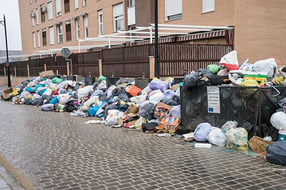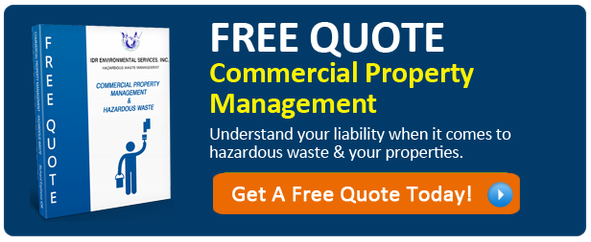Commercial Property Owners Liability Concerning Leftover Hazardous Waste Can Be A Nightmare!
Are you in charge of managing large amounts of commercial real estate? If so, you need to understand the implications of tenants leaving hazardous waste upon terminating a commercial property lease. It is crucial for property managers to understand EPA and Department of Toxic Substances Control (DTSC) regulations and a landlord’s liability regarding commercial real estate and hazardous waste removal from vacated properties.
Hazardous Waste Liability for Commercial Property Owners
The State of California has some of the strictest environmental laws in the country and the enforcement activities of (DTSC) are on the rise. As a result, many property owners are literally finding a “toxic mess on their hands” when long time tenants vacate their properties. As evidenced by enforcement activities that make the news, many California companies are operating outside of federal and state regulations and many landlords may be unaware of their tenant’s activities.
Once a tenant vacates a property, the headache and financial burden transfers to the landlord and the only remedies remaining for them may be a significant legal battle against a former tenant or an expensive hazardous waste removal process. Many times it’s both!
If you're thinking about just throwing the waste away in the dumpster, think again. Take a look at what the DTSC was doing in the shadows just recently.
It is very likely that property owners will be unaware of a problem until it presents itself and for some this issue can be catastrophic, including a regulatory nightmare, a heavy legal burden, and significant financial loss.
Best Practices for Property Managers
Federal and state hazardous waste regulation is a very complex process and most landlords and property managers are unaware of the legal ramifications. Here are some steps to take:
-
Reevaluate Your Lease Agreements – Your first line of defense is your current lease agreement. Consult with an attorney experienced in commercial real estate law to determine if your current agreements go far enough to protect you and your property owners.
-
Visit Your Properties On A Regular Basis – To the extent that your agreements allow you, it is not a bad practice to visit your properties on a consistent basis to and look for signs of trouble. Large piles of debris and open chemical containers are a sign of trouble.
-
Have A Qualified Hazardous Waste Removal Company On Speed Dial - As a property manager, you are going to need professionals that understand how to properly identify and clean up hazardous waste properly and within government regulations.
Finding a Qualified Hazardous Waste Removal Company
It is important that your hazardous waste vendor is licensed and reputable and has experience in the hazardous waste removal process. Hiring the right company helps avoid additional liability. Improper disposal and management of the hazardous waste removal process on your property could lead to additional legal issues and significant regulatory exposure. As soon as are aware that you have a hazardous waste problem, it falls under your jurisdiction to provide the remedy. You are then in charge of disposing of the hazardous waste in a manner that is appropriate for the materials at hand.
Professionals with experience in hazardous waste cleanup and removal can make the process faster, easier and cheaper. A licensed and certified hazardous waste removal company will understand the regulations involved with hazardous waste and will dispose of it accordingly.
It is crucial for you understand the implications of commercial real estate and hazardous waste. This is a significant problem for many commercial landowners. To stay up-to-date with the complex issues dealing with hazardous waste management and the regulatory environment in California, subscribe to our newsletter.


Comment